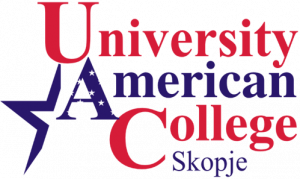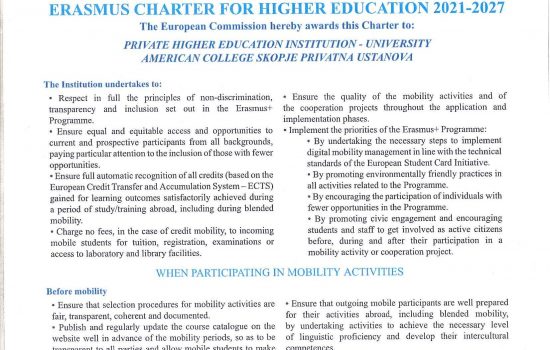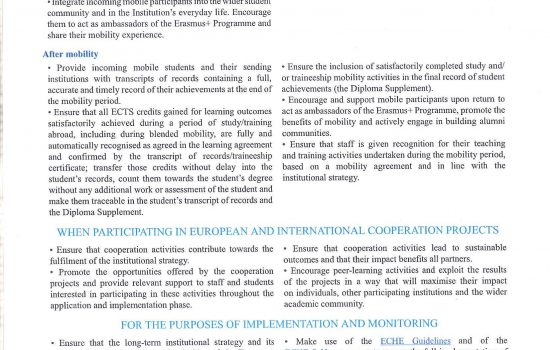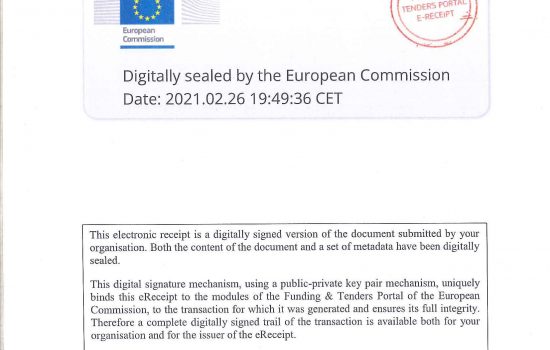Erasmus+ programme
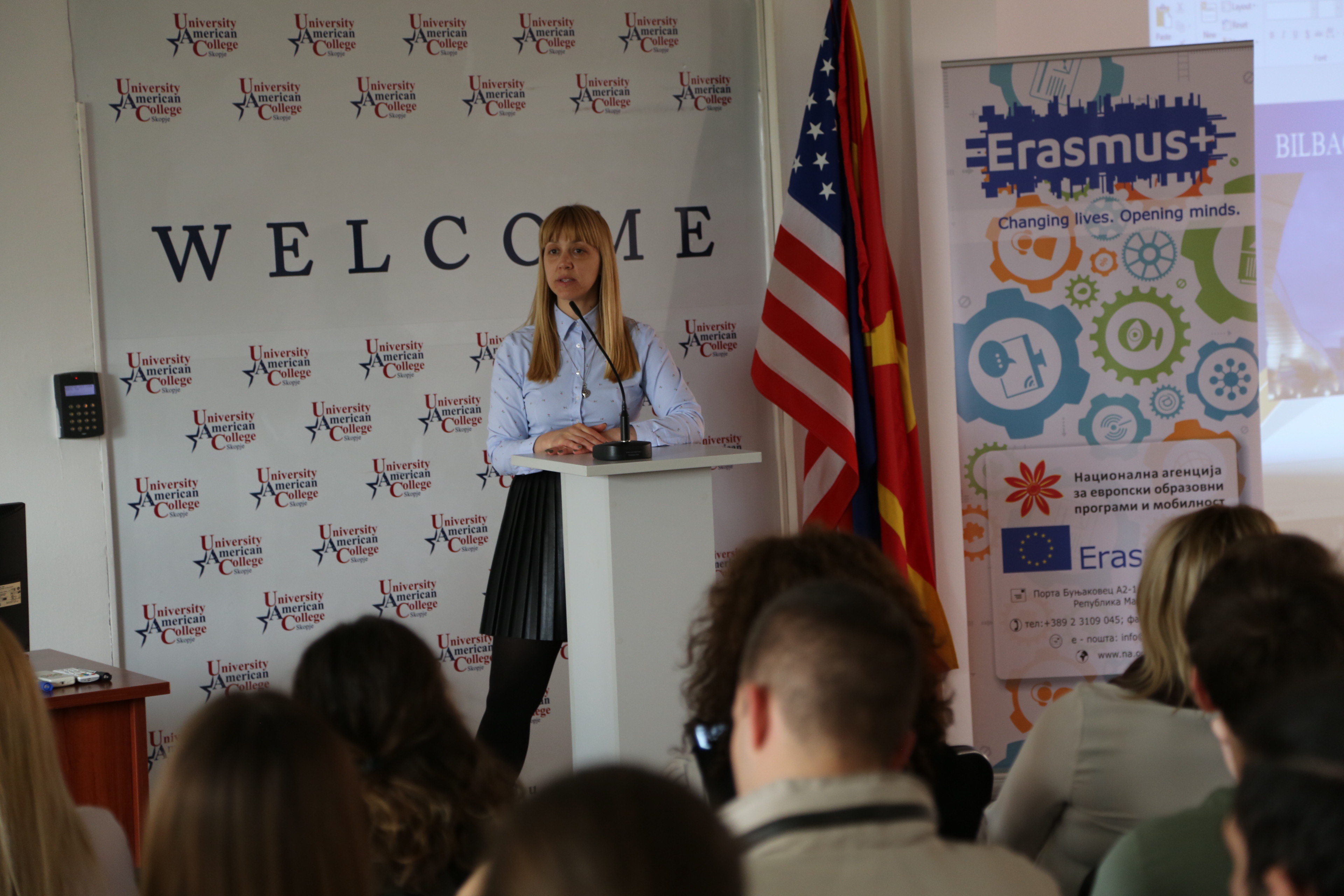 Erasmus + is the European Commission’s exchange programme that enables students in European countries to study, for part of their degree in another country.
Erasmus + is the European Commission’s exchange programme that enables students in European countries to study, for part of their degree in another country.
Why join the Erasmus+ programme?
Erasmus is a great opportunity to spend between 3 and 12 months in another European country, and have it count towards your degree. You get to experience another culture and a new way of looking at your subject. You can make new friends and grow as a person.
If you’d like to come and study here you should first contact the Erasmus Co-ordinator at your own university for initial information and procedures.
UACS students (outgoing students)
The Erasmus programme is open to undergraduates and postgraduates. If you’re interested in studying in Europe you’ll first need to check that your department participates in the program with our Erasmus university partners.Erasmus is open to the majority of departmants, but opportunities will depend on the agreements your department has made and what degree programme you are on.
What Are the Benefits?
The benefits to taking part in the Erasmus + programme are endless! It will enhance your academic and personal development, boost your confidence and improve your CV. You’ll discover a new culture, make new friends across Europe and improve your language skills. Stand out from the crowd!
Where Can I Go?
The Erasmus + programme runs in the 28 EU member states as well as Iceland, Liechtenstein, Norway and Turkey, but UACS must have an agreement with an institution for the mobility to occur. UACS currently has agreements with the following universities, covering various subject areas. Discover more about our partners.
School of Political Science (Psychology)
University in Nicosia, Cyprus https://www.unic.ac.cy/
Universita Degli Studi Di Napoli Federico II, www.unina.it
Alanya Alaaddin Keykubat University School of Business, Turkey https://www.alanya.edu.tr/
Universidade Catolica Portugesa,Lisboa,Portugal http://www.ucp.pt
Üsküdar University, İstanbul, Turkey https://uskudar.edu.tr/
UNICUSANO, Rome, Italy, http://www.unicusano.it/en/
Vytautas Magnus University,Kaunas, Lithuania, http://www.vdu.lt/en/
University of Derby, United Kingdom, www.derby.ac.uk
Ircom-University in Les Ponts-de-Cé, France https://www.ircom.fr/
University of Opole, Poland https://uni.opole.pl/
School of Foreign Languages
University of Keele, Keele, England https://www.keele.ac.uk/
University of Bielsko-Biała, Poland https://www.ath.bielsko.pl/
Karpacka State University in Krosno www.pwsz.krosno.pl
Ondokuz Mayıs University (OMU), Turkey, http://www.omu.edu.tr/en
Angel Knachev University of Ruse, Ruse, Bulgaria https://www.uni-ruse.bg/en/university
University of Pila, Pila, Poland https://puss.pila.pl/
Mehmet Akif Ersoy University, Turkey, http://mehmetakif.edu.tr/
Mugla University,Mugla,Turkey http://www.mu.edu.tr/
Aachen University of Applied Sciences, Aachen , Germany http://www.fh-aachen.de/en/
Politehnica University of Timisoara, Timisoara, Romania http://www.upt.ro/english/
University of Derby, United Kingdom, www.derby.ac.uk
School of Business Economics and Management
HEPL – University College of the Province of Liège, Belgium https://www.
Estonian Entrepreneurship University of Applied Sciences, Tallinn, Estonia www.euas.eu
University Business Academy, Novi Sad, Serbia https://www.fimek.edu.rs/
University of the Basque Country, Spain http://www.ehu.eus/
University of the North, Croatia https://www.unin.hr/category/upisi_preddiplomski/
Alanya Alaaddin Keykubat University School of Business, Turkey https://www.alanya.edu.tr/
EDEM Escuela de Empresarios, Valencia, Spain http://www.edem.es/Inicio.aspx
Singidunum University, Belgrade, Serbia http://study.singidunum.ac.rs/
Universite D’Angers, France http://www.univ-angers.fr
Istanbul University, Istanbul,Turkey, http://www.istanbul.edu.tr/
Angel Knachev University of Ruse, Ruse, Bulgaria https://www.uni-ruse.bg/en/university
Ondokuz Mayıs University (OMU), Turkey, http://www.omu.edu.tr/en
University of National and World Economy, Sofia, Bulgaria http://www.unwe.bg/en/
University of Pila, Pila, Poland https://puss.pila.pl/
University of Applied Sciences Worms, Worms, Germany http://www.hs-worms.de/
Université Catholique de Lille, France , http://www.fges.fr/
Friedrich Schiller University Jena, Germany, http://www.uni-jena.de/
UNICUSANO, Italy, http://www.unicusano.it/en/
Mehmet Akif Ersoy University, Turkey, http://mehmetakif.edu.tr/
Haute Ecole de la Province de Liège, Belgium http://www.provincedeliege.be/
Univesidad de Burgos, Spain http://wwww.ubu.es/
Mugla University,Mugla,Turkey http://www.mu.edu.tr/
University of Applied Sciences Baltazar Zaprešić, Croatia , http://www.vspu.hr
University of Rome Tor Vergata, Ital , http://www.uniroma2.it
Varna Universitu of Management, Bulgaria , http://vum.bg/
Universita di Foggia, Foggia, Italy http://www.unifg.it/
Aachen University of Applied Sciences, Aachen , Germany http://www.fh-aachen.de/en/
ESIC-Business and Marketing School, Madrid, Spain, https://www.esic.edu/
ESIC-Business and Marketing School, Valencia, Spain https://www.esic.edu/valencia
GEA College , Ljubljana, Slovenia http://www.gea-college.si/
Romanian American University, Bucuresti, Romania http://www.rau.ro/index.php?newlang=english
Politehnica University of Timisoara, Timisoara, Romania http://www.upt.ro/english/
Gdansk Management College, Gdansk, Poland http://www.wsz.pl/
Universidade Catolica Portugesa,Lisboa,Portugal http://www.ucp.pt
University of Derby, United Kingdom, www.derby.ac.uk
HEC Liège, Liège, Belgium: https://www.hec.
Université Savoie Mont Blanc, Annecy, France: https://www.univ-smb.
Universite catholique de l’ouest, Angers, France: https://www.uco.fr/fr
School of Political Science
University in Nicosia, Cyprus https://www.unic.ac.cy/
Alanya Alaaddin Keykubat University School of Business, Turkey https://www.alanya.edu.tr/
Üsküdar University, İstanbul, Turkey https://uskudar.edu.tr/
Istanbul University, Istanbul,Turkey, http://www.istanbul.edu.tr/
Ondokuz Mayıs University (OMU), Turkey, http://www.omu.edu.tr/en
Yalova University, Yalova,Turkey http://www.yalova.edu.tr/
UNICUSANO, Italy, http://www.unicusano.it/en/
Université Catholique de Lille, France , http://www.fges.fr/
Mehmet Akif Ersoy University, Turkey, http://mehmetakif.edu.tr/
Mugla University,Mugla,Turkey http://www.mu.edu.tr/
Vytautas Magnus University,Kaunas, Lithuania, http://www.vdu.lt/en/
Aachen University of Applied Sciences, Aachen , Germany http://www.fh-aachen.de/en/
Universidade Catolica Portugesa,Lisboa,Portugal http://www.ucp.pt
Gdansk Management College, Gdansk, Poland http://www.wsz.pl/
University of Derby, United Kingdom, www.derby.ac.uk
School of Law
University in Nicosia, Cyprus https://www.unic.ac.cy/
New Bulgarian University, Sofia, Bulgaria https://nbu.bg/en
Istanbul University, Istanbul,Turkey, http://www.istanbul.edu.tr/
Ondokuz Mayıs University (OMU), Turkey, http://www.omu.edu.tr/en
Angel Knachev University of Ruse, Ruse, Bulgaria https://www.uni-ruse.bg/en/university
UNICUSANO, Italy, http://www.unicusano.it/en/
Université Catholique de Lille, France , http://www.fges.fr/
Gdansk Management College, Gdansk, Poland http://www.wsz.pl/
School of Computer Science and Information Technology
Estonian Entrepreneurship University of Applied Sciences, Tallinn, Estonia www.euas.eu
University of the Basque Country, Spain http://www.ehu.eus/
Singidunum University,Belgrade, Serbia http://study.singidunum.ac.rs/
Üsküdar University, İstanbul, Turkey https://uskudar.edu.tr/
Ondokuz Mayıs University (OMU), Turkey, http://www.omu.edu.tr/en
Université Catholique de Lille, France , http://www.fges.fr/
University of the Basque Country, Spain http://www.ehu.eus/
Mehmet Akif Ersoy University, Turkey, http://mehmetakif.edu.tr/
Mugla University,Mugla,Turkey http://www.mu.edu.tr/
University of Applied Sciences Baltazar Zaprešić, Croatia , http://www.vspu.hr
Aachen University of Applied Sciences, Aachen , Germany http://www.fh-aachen.de/en/
Romanian American University, Bucuresti, Romania http://www.rau.ro/index.php?newlang=english
Politehnica University of Timisoara, Timisoara, Romania http://www.upt.ro/english/
Angel Knachev University of Ruse, Ruse, Bulgaria https://www.uni-ruse.bg/en/university
School of Architecture and Design
Ondokuz Mayıs University (OMU), Turkey, http://www.omu.edu.tr/en
Mehmet Akif Ersoy University, Turkey, http://mehmetakif.edu.tr/
Politehnica University of Timisoara, Timisoara, Romania http://www.upt.ro/english/
Gazi University, Ankara, Turkey http://gazi.edu.tr/
ECTS is a standard for comparing the study attainment and performance of students of higher education across the European Union and other collaborating European countries. For successfully completed studies, ECTS credits are awarded. One academic year corresponds to 60 ECTS creditsthat are equivalent to 1500–1800 hours of study in all countries respective of standard or qualification type and is used to facilitate transfer and progression throughout the European Union.
UACS students who want to study abroad by this program must apply on the following link Erasmus+ OPEN CALL Spring 2024 . They have to contact the study abroad coordinator and electronically submit the online Erasmus application form together with motivation letter, ECTS Coordinator approval, Deans approval and official transcript.
International Program Office handles the application process and communication with the host university.
The applications are processed by the study abroad committee. The committee will be comprised of:
- The ECTS coordinator
- The Dean of the School whose student is applying
- The Head of International program Office
When making a decision on potential candidate(s), the Study Abroad Committee will compare all students interested in participating in a particular program. A list of the best candidates will be made in order of precedence (i.e. the best candidate first). If for any reason, the first candidate cannot participate in a program for which he/she was selected, the second in line will take his/her place.
Eligible students will receive a grant, provided by the EU, which is a contribution to the extra costs arising from studying abroad. The amount you receive will depend on where you go and the duration of your stay. You will also continue to receive any student loans to which you’re entitled during this period and don’t pay tuition fees to the host university. Erasmus+ students are exempted from paying fees for tuition, registration, examinations and access to laboratory and library facilities at the host institution.
A “Learning Agreement” is setting out the programme of studies to be followed and is approved by the student, the sending and the receiving institution/university.
The Learning Agreements puts its emphasis on the thorough preparation of the mobility by including all the educational components/learning outcomes for the future recognition as well as the required language competence of the student.
All three parties signing the agreement commit themselves complying with all the arrangements agreed, thereby insuring that the student should receive the recognition for the studies.
Each Erasmus+ student will be given an Erasmus+ Student Charter after their selection. The Student Charter highlights the rights and obligations of students participating in Erasmus+. It informs Erasmus+ students about what they are entitled to and what is expected of them during their secondment for studies.
In particular, the Erasmus+ Student Charter outlines the basic entitlements of the Erasmus+ students, such as free tuition and full recognition of studies or traineeship abroad. The Charter also specifies the main obligations of the Erasmus+ students, providing them with a concise idea of their duties with regard to both their sending and receiving higher education institutions/enterprise.
You can also read “Your rights as a mobile student ” (Youth on the Move guide to the rights of mobile students in the European Union)
What arrangements are made by the Int Program Office?
Prior to the departure the Erasmus+ student is provided with:
A grant agreement covering the mobility period and signed between the student and his or her sending higher education institution;
- A “Learning Agreement” setting out the programme of studies to be followed, as approved by the student, the sending and the receiving institution;
- The “Erasmus+ Student Charter” setting out the student’s rights and obligations with respect to his/her period of study abroad.
At the end of the period abroad:
- The receiving institution must provide the student and their sending institution with a transcript of records confirming that the agreed programme has been completed and confirming the results;
- The sending institution must give full academic recognition for satisfactorily completed activities during the mobility period as agreed in the Learning Agreement, by using ECTS credits or an equivalent system. The mobility period should also be recorded in the Diploma Supplement.
For more info on Erasmus you can contact the UACS Erasmus Coordinator Ms. Viktoria Gombar at gombar@uacs.edu.mk or visit http://www.na.org.mk to learn more about Erasmus + program.
